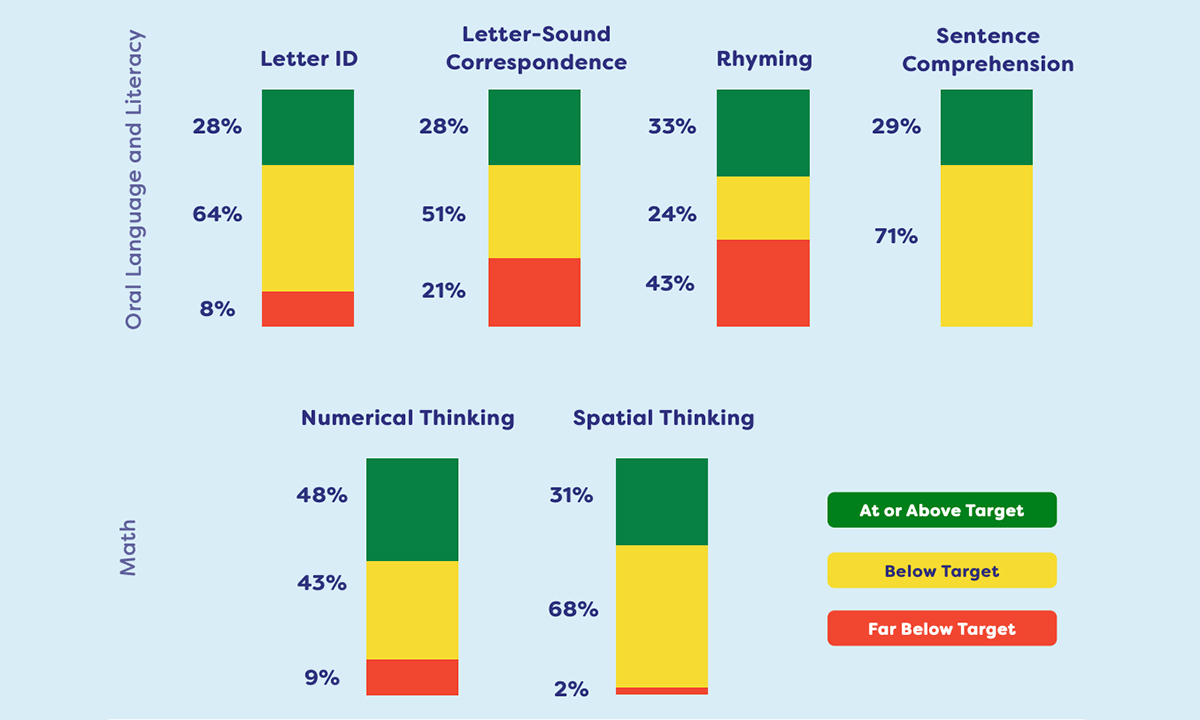Closing the Data Gap for Indiana’s Littlest Learners, & a Model for Other States
Fiddian-Green & Creech: Our organizations helped create a readiness assessment that provides a standard, objective set of measures for pre-K students

Get stories like this delivered straight to your inbox. Sign up for The 74 Newsletter
In the years since the pandemic forced K-12 schools to shift to remote education, student outcomes have suffered, from lower test scores to reduced engagement. Schools are investing in a number of interventions to help students catch up, such as summer learning programs and high-dosage tutoring. But while these reactive efforts are necessary, it is equally critical to take proactive steps to prevent future learning declines.
Building a system where all students have the tools to succeed means starting with a strong foundation in early education. Research suggests that enrollment in high-quality early learning programs can have a lasting positive impact on academic and life outcomes, influencing educational attainment, employment rates and health, among other factors.
But despite increasing interest in developing high-quality pre-K programs, the lack of reliable and objective measures of children’s readiness for kindergarten leaves policymakers and state education leaders in the lurch. Without this information, it is difficult to understand how many students are entering kindergarten without the necessary prerequisites and, therefore, how large the need is for high-quality pre-K seats and where that need is the highest.
In 2014, for instance, Indiana lawmakers mandated a longitudinal study about the impact of the new, state-funded On My Way Pre-K program. But officials and early childhood leaders determined there was no standardized method of measuring education outcomes among pre-K children statewide. There also wasn’t a single assessment that could be used to measure all desired outcomes, both academic and social-emotional.
Our organizations, the Indianapolis-based Richard M. Fairbanks Foundation and the Evansville, Indiana-based Welborn Baptist Foundation, saw an opportunity to address the data gap. In 2017, we contracted with NORC at the University of Chicago to help identify and pilot a solution. Together, we supported the development of the Kindergarten Readiness Indicators, an assessment that provides a standard, objective set of measures for pre-K students about to enter kindergarten.
The indicators provide policymakers, early childhood center directors and teachers, advocacy groups, funders and others with the first-ever quantitative data on the proficiency of Indiana’s pre-K students in math, oral language and literacy – foundational skills that underpin academic success in elementary school and beyond. The assessment takes fewer than 20 minutes to administer and relies on direct measurement of skills, rather than teacher observation. The resulting data can be aggregated at the classroom, provider, local, regional and state levels, meaning it can provide valuable insights for early childhood center directors and classroom teachers as well as city, county and state officials.
In 2018-19, our two foundations awarded funding to Early Learning Indiana and Building Blocks to facilitate a pilot of the Kindergarten Readiness Indicators with a variety of early childhood providers in Indianapolis and Evansville. The pilot showed the results were predictive of how prepared children were for kindergarten but that too few were meeting national targets for kindergarten readiness.
In 2019, we gave the intellectual property for the assessments to the State of Indiana, which adopted the KRI as a required test for On My Way Pre-K. It was administered for the first time in April 2021, and the results were released in early 2022. Across 320 early learning programs in 55 counties, most students were found to be performing below target academic indicators across all categories measured. There were also gaps based on gender and race — for instance, girls scored higher than boys on all oral language and literacy skills, and white students scored higher than Black and Hispanic children in five out of six categories in oral language and literacy skills, as well as math and spatial thinking.
The data are likely indicative of the impact of COVID-19 on even young learners. But given similar results during the pilot, which predated the pandemic, it is evident that much more must be done to support young learners and early childhood educators alike. With the KRI, Indiana now has a starting point to gauge against and improve upon, and the data will help the state, providers and philanthropy better allocate public and private resources to strengthen early childhood education.
Pre-K has a tremendous impact on life and learning outcomes, which is why building early learning measurement systems is critical. As states recover from the challenges of COVID-related learning losses, they may find it effective to adopt similar strategies to what proved effective in Indiana: collaborating across organizations, education providers and state leaders to develop holistic solutions for students and educators.
Get stories like these delivered straight to your inbox. Sign up for The 74 Newsletter

;)

